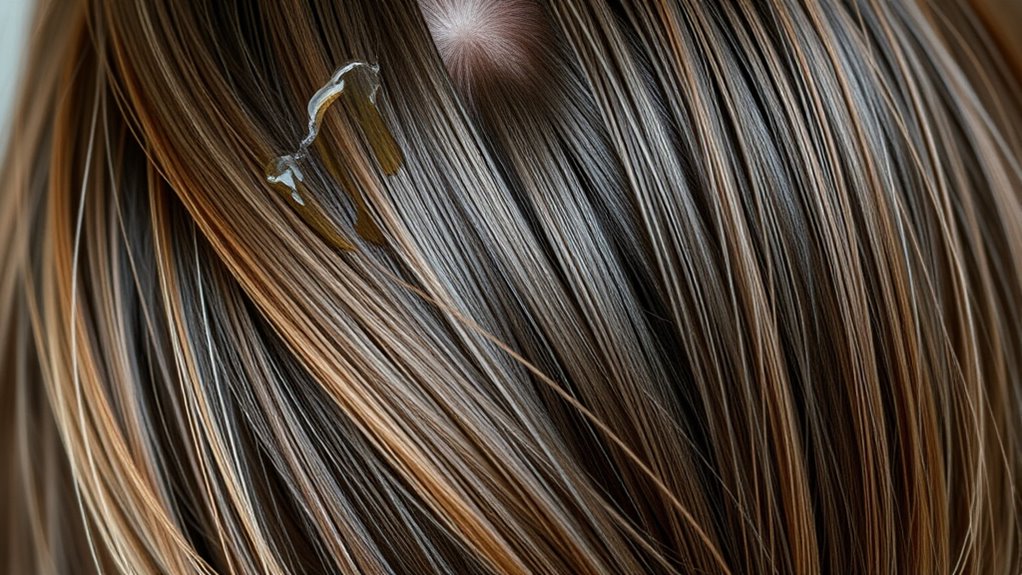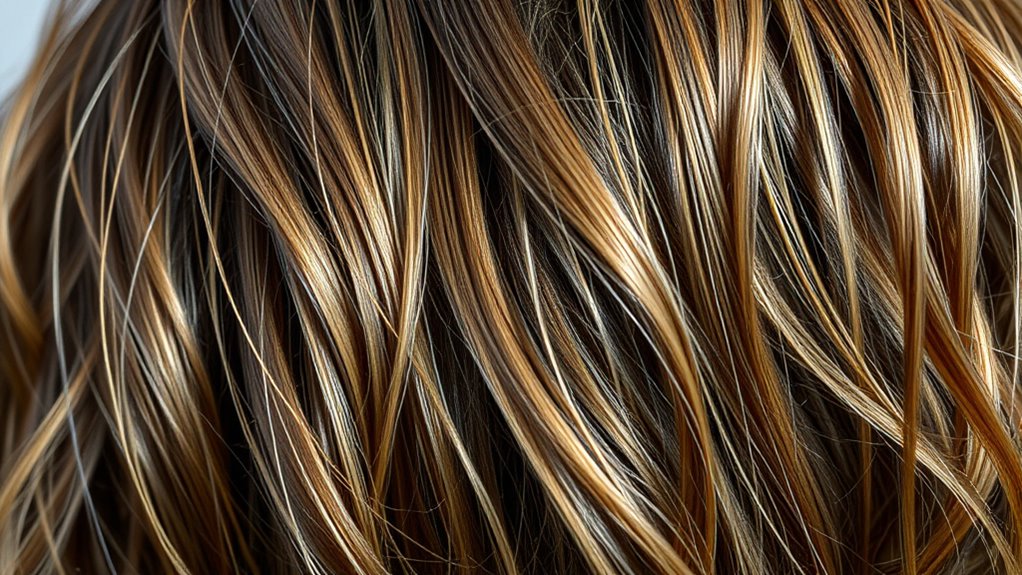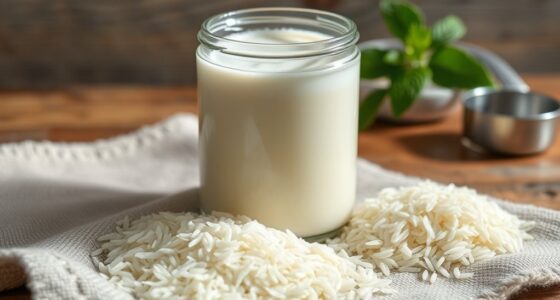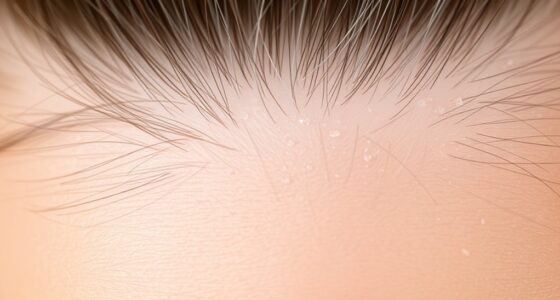Applying too much oil at once or focusing only on your roots can lead to greasy strands and clogged scalp pores. If you leave oil on your hair for too long or don’t distribute it evenly, it can cause buildup and weaken your strands over time. Using heavy or inappropriate oils can make hair dull and prone to breakage. Keep these mistakes in mind—there’s more to discover to protect your hair’s health.
Key Takeaways
- Overapplying oil causes buildup, clogged pores, and dull strands, weakening hair over time.
- Focusing only on roots neglects mid-lengths and ends, leading to dryness and breakage.
- Applying oil immediately before washing hampers absorption and leaves residues that weaken strands.
- Using heavy or inappropriate oils weighs down hair, reducing volume and causing strain on strands.
- Inadequate washing after oiling leaves residue, increasing the risk of buildup and strand damage.

Many people make common mistakes when layering hair oils, which can lead to greasy roots, weighed-down strands, or ineffective nourishment. One of the biggest errors is applying too much oil at once or focusing on the wrong areas. If you don’t pay attention to scalp health, you might clog your pores, leading to scalp issues like dandruff or irritation. When oil sits on your scalp for too long without proper absorption, it can cause build-up, making your hair look dull and lifeless. To avoid this, you need to understand how oil absorption works on your scalp and strands. The scalp is designed to absorb some oil naturally, but excess oil can overwhelm this process, preventing your hair from getting the nutrients it needs. Instead of applying generous amounts all over, focus on a small amount and massage it into your scalp thoroughly. This stimulates blood flow, encourages better absorption, and helps maintain a healthy scalp environment.
Another mistake is applying oil unevenly or without distributing it properly. Many tend to concentrate oil on the roots, neglecting the mid-lengths and ends, which tend to be drier and more prone to damage. When you do this, roots can become greasy while the ends remain dull and brittle. To optimize oil absorption and support hair health, you should evenly distribute the oil from roots to tips, paying extra attention to the ends. This ensures each strand receives nourishment without overloading any particular area. Also, avoid massaging in a hurried manner; gentle, thorough strokes help the oil penetrate better, improving scalp health and strand strength. Additionally, understanding the contrast ratio of your hair care products can help you choose oils that won’t weigh down your hair or cause dullness.
Timing is another vital factor. Applying oil too close to washing time can hinder proper absorption, leaving excess oil on your scalp and strands. Ideally, you should leave the oil in for a few hours or overnight, giving it enough time to deeply nourish your hair and scalp. When you rinse, ensure you wash thoroughly to remove residual oil that can otherwise clog hair follicles and weigh down your strands. Remember, the goal is to strike a balance: enough oil to nourish without causing buildup or greasy roots. Using a lightweight oil or applying less product can help achieve this balance and promote healthier, shinier hair.
Frequently Asked Questions
Can Hair Oil Layering Cause Scalp Buildup?
Yes, layering hair oil can cause scalp clogging if you use too much or don’t wash it out properly. When you apply oil frequently, it can lead to oil accumulation, which blocks hair follicles and causes scalp buildup. This buildup hampers healthy hair growth and can lead to greasy, dull hair. To avoid this, use oil sparingly and make sure you wash your scalp regularly to prevent scalp clogging.
How Often Should I Oil My Hair to Avoid Damage?
You should oil your hair 1-2 times a week to prevent scalp dryness and maintain hair shine. Over-oiling can lead to buildup, causing scalp issues and weakening strands. Pay attention to how your scalp responds; if it feels greasy or itchy, reduce frequency. Using the right amount of oil helps nourish your hair without damaging it, ensuring your strands stay healthy and shiny.
Is It Harmful to Leave Oil in Overnight Regularly?
Leaving oil in your hair overnight isn’t inherently harmful, but it can lead to overnight damage if not done properly. If you don’t wash out excess oil, oil residue can build up, trapping dirt and causing scalp issues. Regularly leaving oil in without rinsing thoroughly might weaken strands over time. To avoid damage, use a small amount, and make sure you wash your hair thoroughly in the morning.
Which Hair Oils Are Best for Different Hair Types?
Imagine giving your hair a tailored treat—choosing the right hair oil types can work wonders. For fine hair, light oils like argan or jojoba are gentle but nourishing. Curly or coarse hair benefits from richer oils like coconut or castor, providing extra moisture. Understanding your hair type helps you pick hair type specific oils, ensuring your strands stay healthy, shiny, and strong without weighing them down or causing buildup.
Can Layering Hair Oil Prevent Hair Fall Effectively?
Layering hair oil can help prevent hair fall by boosting scalp hydration and improving oil absorption efficiency. When you apply the right oils correctly, they nourish your scalp and strengthen strands, reducing breakage. Just be careful not to overdo it, as excessive layering may clog pores. Focus on a balanced routine, massage gently, and choose oils suited for your hair type to see the best results in preventing hair fall.
Conclusion
Avoid these hair oil layering mistakes to keep your strands healthy. Think of your hair like a garden; too much product is like overwatering—it drowns the roots. I once tried layering oils daily, only to end up with dull, weighed-down hair. Remember, balance is key. When you apply oils correctly, you nourish your strands like sunshine and water nurture plants—helping them grow strong, shiny, and vibrant. Take care, and your hair will thank you.









